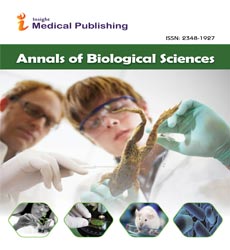ISSN : 2348-1927
Annals of Biological Sciences
Pineal and Hypophyseal Responses to Selenium Treatments in Light Deprived Adult Female Wistar Rats
1Department of Physiology, Edo University Iyamho, Edo State, Nigeria
2Department of Physiology, University of Benin, Benin-City, Nigeria
Abstract
Darkness is a potent stimulus for melatonin secretion. Studies have also reported that pineal and hypophyseal endocrine secretions are influenced by nutritional factors. The study was designed to investigate the combined effect of selenium supplementations and light deprivation on the pineal and hypophyseal secretions in female Wistar rats. 36 female cyclical Wistar rats were divided into the vehicle, High Selenium (HS), Low Selenium (LS), Light Deprived (LD), LD+HS and LD+LS. Rats were orally administered 150 μg/kg and 100 μg/kg of sodium selenite for two weeks. While light deprived rats were maintained under a 6 hr light/18 hr dark cycle, other rats were under a natural 12 hr light/12 hr dark cycle. The result showed that light deprivation led to a significant decrease (p<0.05) in Follicle Stimulating Hormone (FSH) secretion and a significant increase (p<0.05) in plasma melatonin. Selenium supplementations at both doses also improved Luteinizing Hormone (LH) secretion but had no effect on plasma prolactin. At a high dose of selenium supplementation, there was an increase in melatonin secretion. In light deprived rats, selenium supplementations caused a significant decrease (p<0.05) in melatonin secretion at both doses but there was no significant change in plasma levels of FSH, LH and prolactin. The findings indicate differential responses of the pineal and hypophyseal glands to light deprivation and selenium treatments
Retraction Note
The article entitled “Pineal and Hypophyseal Responses to Selenium Treatments in Light Deprived Adult Female Wistar Rats” has been accepted for publication in the Annals of Biological Sciences considering the statements provided in the article are personal opinion of the author which was found to be not having any conflict or biasedness towards anything. As the article was a perspective one, the information provided by the author was considered as an opinion to be expressed through publication. Publishers took the decision to make the article online solely based on the reviewer's suggestion. However, due to some unavoidable issues and concerns on behalf of the authors, the article is being retracted from the journal.
Open Access Journals
- Aquaculture & Veterinary Science
- Chemistry & Chemical Sciences
- Clinical Sciences
- Engineering
- General Science
- Genetics & Molecular Biology
- Health Care & Nursing
- Immunology & Microbiology
- Materials Science
- Mathematics & Physics
- Medical Sciences
- Neurology & Psychiatry
- Oncology & Cancer Science
- Pharmaceutical Sciences
